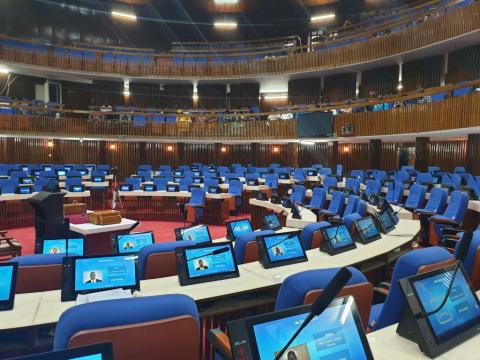By Mohamed Jaward Nyallay
Parliament in Sierra Leone has amended the country's sexual offence law to include new provisions including one that targets sexual solicitation. The law against solicitation is part of the amended Sexual Offences Act passed in the House on Thursday.
During the presentation of the bill in Parliament, Chairman of the Legislative Committee, Hindolo Gevao, MP, said they wanted to discourage solicitation, saying: “We were very unanimous on this. This law is against those lecturers, coaches, pastors, imams, ministers or any person within a position of authority”.
Gevao said this addition to the law would deter the commission by those who have “fiduciary relationship with another person; a parent and child, a parent and a ward, so long as you have a fiduciary relationship with somebody and you go ahead and perpetrate a sexual offence against that person”.
The new law prescribes jail term and fines for people in authority who harass their subordinates for sex.
Sexual solicitation is common in workplaces, universities and schools in Sierra Leone. But it is difficult for victims to come forward because they don’t have the necessary guarantee or protection by the law.
The new Sexual Offences Act also focuses on minimum and maximum sentences. The law has given judges more discretion to sentence people from 15 years to life imprisonment. The previous law prescribed a maximum of 15 years.
The new law also prescribes punishment for child perpetrators. Children who are convicted of sexual offences can now be sent to the juvenile detention center at Approved School to serve their sentence and later send them to Correctional Centers once they reach 18 years, which is the legal adult age in Sierra Leone.
During the debate on the major amendments on the bill, Rebecca Yei Kamara, MP from Kono District, said: “In my district, we have one of the highest numbers of rape cases. And if you see the perpetrators, they are all around 15,16, 17 years. They are all children.”
Despite the seeming support for amendment of the Sexual Offences Act, its passing did not come without controversy. There were times during the debate on Thursday when Parliamentarians were engaged in arguments for up to half an hour on some sticky points. It took parliament over five hours debating details of the bill – disagreeing, agreeing and amending.
Paramount Chief Bai Koor Kanagbaro Sanka III, MP, was one of the very critical voices on many of the aspects that were up for amendment. In a certain case, he was adamant the law should establish a statute of limitation for rape cases.
“The Act is so open that anybody can come at any time and make allegations. There is no limitation. We have to be careful,” he warned.
At another instance, he was also against children going to prison. He was insisting that the time they would spend at Approved School should be enough to reform them.
In response to the Chief’s comment, the Deputy Minister of Justice, Umaru Napoleon Koroma, who was in Parliament, said complaints about rape cases could not be given a timeline.
“A criminal offence cannot be limited by time. For example, murder is murder, no matter when it happened,” Koroma said.
Long time campaigner for women’s right, Fatmata Sorie, welcomed the passing of the law. She said the country now had a stronger law that considered everyone’s concern, noting that the next phase would be advocacy.
“Advocacy is the next stage to get people to understand the content of the bill, the penalties that are involved. We will engage community leaders, religious leaders and other stakeholders,” said Sorie, who is the president of the all-female lawyers group known by its acronym, LAWYERS.
The Ministry of Social Welfare Gender and Children’s Affairs has been instrumental in pushing through this law. The Deputy Minister, Mohamed Haji Kellah said they were going to consult with stakeholders on how to communicate the new law.
“We are going to call a meeting next week of key stakeholders to actually now come and sit down to take stalk of what has happened [and] what this law means!.
The bill is expected to be signed in to law by President Julius Maada Bio on Friday. President Bio’s declaration of rape as a national emergency was what triggered this entire amendment process; a declaration that had come in the wake of an alarming rate of rape of especially minors.
© 2019 Politico Online









